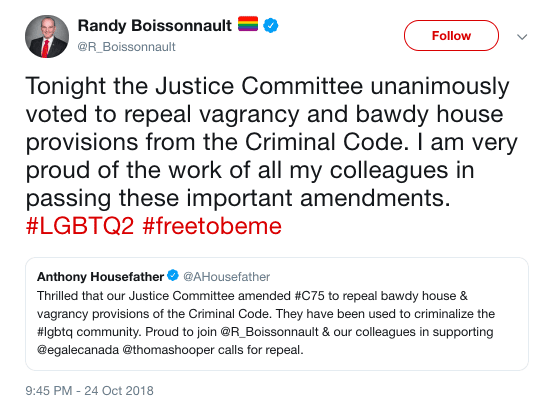The House of Commons justice committee voted to amend the government’s Criminal Code reform Bill C-75 that would strike several additional laws that have historically targeted LGBT Canadians. The committee was unanimous in recommending that laws criminalizing vagrancy, and operating or being found in a bawdy house be repealed along with the anal sex law.
If the amendments are accepted by Parliament at the report stage and third reading, C-75 will be sent to the Senate for final approval before it becomes law.
C-75 removes a number of outdated laws from the Criminal Code and makes a number of other changes such as reducing some maximum penalties and changing some rules of evidence.
As part of the government’s historic apology for anti-LGBT persecution in Canada, the government has touted the repeal of Section 159 — the law that criminalizes certain types of anal sex — in multiple bills prior to the proposed repeal of Section 159 in Bill C-75. However, LGBT activists were frustrated that other laws which had historically been used to unjustly persecute queer people were retained in the bill despite the government’s stated intent.
Historian Tom Hooper, who had testified at the committee about how these crimes affected LGBT people in Canada, credits all parties for supporting the repeal, but credits NDP MP Murray Rankin for leading the way.
“When we went to committee, [Rankin] appeared at a press conference and said publicly he was going to move these amendments, and I think that forced the government’s hand,” Hooper says. “I think [the committee’s Liberals] had to spend some political capital in order to get the government to allow them to do this and I’m very grateful. I think it shows the independence of the justice committee.”
Committee member Randy Boissonnault, who also serves as the prime minister’s special advisor on LGBTQ2 issues, tweeted that he was “proud” of the committee for making the amendments.

“Tonight the Justice Committee unanimously voted to repeal vagrancy and bawdy house provisions from the Criminal Code. I am very proud of the work of all my colleagues in passing these important amendments,” he wrote.
But Hooper says there’s still work to be done to address anti-queer sections of the Criminal Code.
“While we should celebrate this historic win, the historians that got together to fight this actually had the bawdy-house law as part of a much bigger problem,” Hooper says. “The Criminal Code includes all sorts of antiques, such as indecent acts, immoral theatrical performance, obscenity, the [sex work law], and still no action on HIV criminalization.”
Even though these clauses are used less frequently against queer people today, retaining them in the code can still affect those who’ve been persecuted under them. Under the government’s expungement bill, queer people can only apply for expungement of convictions under an approved list of charges, and the government can only add charges to the list if those sections of the Code have been repealed.
Section 179 of the Code criminalizes every person who “supports himself in whole or in part by gaming or crime and has no lawful profession or calling by which to maintain himself” and was used particularly against homeless queer people, trans people and sex workers. The committee heard that only two convictions under vagrancy were made in the last 20 years. The committee voted unanimously to repeal it.
“Vagrancy was one of those crimes used by police against anyone they found on the street,” Hooper says. “It was also used if you wore clothing of the wrong gender you could be charged with vagrancy.”
NDP MP Murray Rankin told the committee that his research showed there had only been two convictions of vagrancy in the past 20 years.
“It struck me that it’s not serving an important social purpose anyway.”
After a brief debate, the committee voted unanimously to repeal the vagrancy law. The committee also voted unanimously to repeal both Section 210 and Section 211, as well as the definition of a bawdy-house in Section 197.
Section 210 criminalizes anyone who kept, owned, worked in, or was found in a “common bawdy-house,”and is defined in Section 197 as a place that is kept “for the practice of acts of indecency.” Another law, Section 211, makes it a crime to transport anyone to a bawdy-house. The laws were frequently used to charge people who worked or were found in bathhouses during the bathhouse raids from the 1960s to as recently as 2004. Hooper has estimated that at least 1300 men were charged under the bawdy-house law In that period.
In its 2005 Labaye decision and 2013 Bedford decision, the Supreme Court greatly reduced the scope of the law so that places like bathhouses and sex clubs would no longer be considered places for acts of indecency, but left the law on the books. The committee heard from Department of Justice staff that the court has since required that “serious harm” be caused for the section to be triggered.
In introducing the amendment to strike all the bawdy-house provisions from the Code, Boissonnault noted the laws’ disproportionate use against queer men.
“It’s important for us to put a fine point on this, that we had mostly men who were criminalized for same-sex consensual behaviour because of where it took place,” he said. “The PM made reference to this in his historic apology to the LGBTQ community. We think it is the right thing to do.”
After Department of Justice staff explained that they believed that other sections of the Criminal Code would adequately cover sexual exploitation and non-consensual sex, the committee voted unanimously to strike all the references to bawdy-houses from the Criminal Code.
Committee chair and Liberal MP Anthony Housefather noted after the vote that if the bill passes, it opens the door for the government to expand the list of historically unjust crimes for which LGBT Canadians can apply for expungements. Under the Expungement of Historically Unjust Convictions Act, the government can only allow expungements if the crime has been repealed from the Criminal Code and the government has subsequently added the crime to the Act’s schedule.
“We are essentially allowing people . . . while they’re still alive to know that they were vindicated and unjustly convicted,” Housefather said. “It was a very sad and sorry part of Canadian history and I’m really glad this committee and all three parties is doing its part to remove that horrible gap in our history.”
The committee also voted unanimously to agree with the section of C-75 that repeals the law criminalizing anal sex.
“It’s a section that the LGBT community has been asking for decades to be removed from the Criminal Code,” Boissonnault said before the repeal vote. “It criminalizes consenting same-sex activity for young men. It’s the right thing to do.”
The committee rejected proposed amendments by the Green Party and the NDP to strike Section 173 of the Code, which criminalizes “indecent acts.” That section had historically been used to criminalize gay sex acts other than anal sex, Hooper told Xtra.
“In many cases, it was used instead of charges of buggery or gross indecency because indecent acts was a lesser offence and easier to prove in court,” Hooper said.
However, committee members expressed concern that removing that section would risk leaving a legislative gap that would allow sexual acts in public or in front of unwilling participants.
“I think removing this section is consistent with the PM’s apology to LGBTQ community,” Green Party Leader Elizabeth May said to the committee before the unsuccessful vote. “I don’t think we should be so quick to leave such an offensive statute on the books.”
The committee could not address Criminal Code provisions that criminalize obscenity or immoral theatrical performances as these were not addressed in C-75, and under Parliament’s rules, the committee can only make recommendations directly related to the bill being studied.
Legacy: November 3, 2018 12:19 pmThis story has been corrected to include Elizabeth May’s last name.


 Why you can trust Xtra
Why you can trust Xtra


